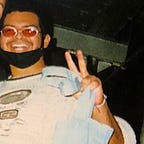Unintuitive First
For Aristotle, there are five major modes of knowledge. Intuitive reason is one of such modes. Before we begin exploring how intuitive reason is possible and if such a notion exists, I must briefly elaborate on what exactly is intuitive reason. Aristotle describes it as so
intuitive reason grasps the first principles
The unfamiliar will ask, “what exactly are first principles”? To my understanding, they are fundamental ideas that are understood without prior experience. First principles cannot be observed empirically, but rather are arrived at by sheer intuition of reasoning. This is Aristotle’s attempt to the give his philosophies, and to an extent philosophy as a discipline, a fundamental base to describe unique phenomena. Any discipline needs grounds to work on; however, providing a base for philosophy can prove to be a daunting task when the base, the principles, are not an exception to further questioning — let alone a base founded on intuition alone.
And yet, however shaky the grounds may be for the first principles, Aristotle has given rise to the branch of metaphysics, which in one way or another is a foundation — not the foundation…but a cornerstone nevertheless.
Now, to determine whether such intuitive principles exist, ideas, what have you, is a large undertaking to the say the least. It’s occupied a major portion of philosophers’ time. But to avoid any further digressions, I’ll strictly write about my own take on it from here on end.
Truth be told, any conception of intuitive principles seems nothing more than pure abstracta, mind reaching for light in the depths of absolute darkness, an attempt to scavenge to the crevices of endless chasms — -of the infinite underworking’s of the mind, the universe, so on and so forth.
Alas, however fruitless this attempt may be, I still want to believe there is grounds beyond the chasms. Something, surely, something must be there. But perhaps, it’s only a coping mechanism for my mind that can only grasp the infinite with the finitude. So, I ask myself, what then could possibly be known intuitively. And here I’ll avoid bringing up other philosophers’ ideas of what can be known intuitively solely on the fact that I believe it is a cop out, and wholly unoriginal approach to answer this question.
The simplest answer I can provide at the moment without bashing in my head to answer this all so encompassing question is this: there is something here. And no, this is in no way an effort to be pretentious or provide a snarky answer. So, what then do I mean by that? Well, simply put, it is this: all we can intuitively grasp is that there exists this infinitesimally small moment passing before us, as we speak, as we think…the very thought of it, and it no longer exists. But It is not strictly, temporal, nor spatial, nothing in semblance to spiritual or mental. It is not some funny monad or causal relation. It does not lie in words; it does not lie in me or you. It passes through us, so incredibly fast, and somehow slow enough to recognize the magnanimity of it. There is no better way to put it other than present-ness. But again, do not confuse this with time. For time is not intuitively known without reference to some beginning. Or to something that is relatively speaking a beginning. Rather, this present-ness exists here and then it is immediately annihilated, so in no shape or form can it be temporal.
So, is this really known intuitively? I’d argue yes. We do not reflect on it, and it cannot be isolated from sensual experiences. It is the collection of uncountable presents that give birth to time and space and everything behind the veil. Each person, animal, planets and the like have a ceaseless amount of presents. And in each of them, just an arbitrary and insignificant amount of reality, but nevertheless real. The multiplicity of all so many presents gives birth to every real thing before us. It does not arise from the past, for those were past presents, and it does not give birth to future, for there is no such thing.
There arises many questions and I question myself whether I believe this or not. Is it some property belonging to something? Why am I using temporal language if it is not time? Is it an object itself? Could such a thing even be called a thing if it exists for an infinitely small moment? My response is I don’t know. That is why I settle for saying something here. A better option in this case would be to leave a blank. For present-ness is just that. Unoccupied non temporal immaterial not object. What more could it be than just that.
